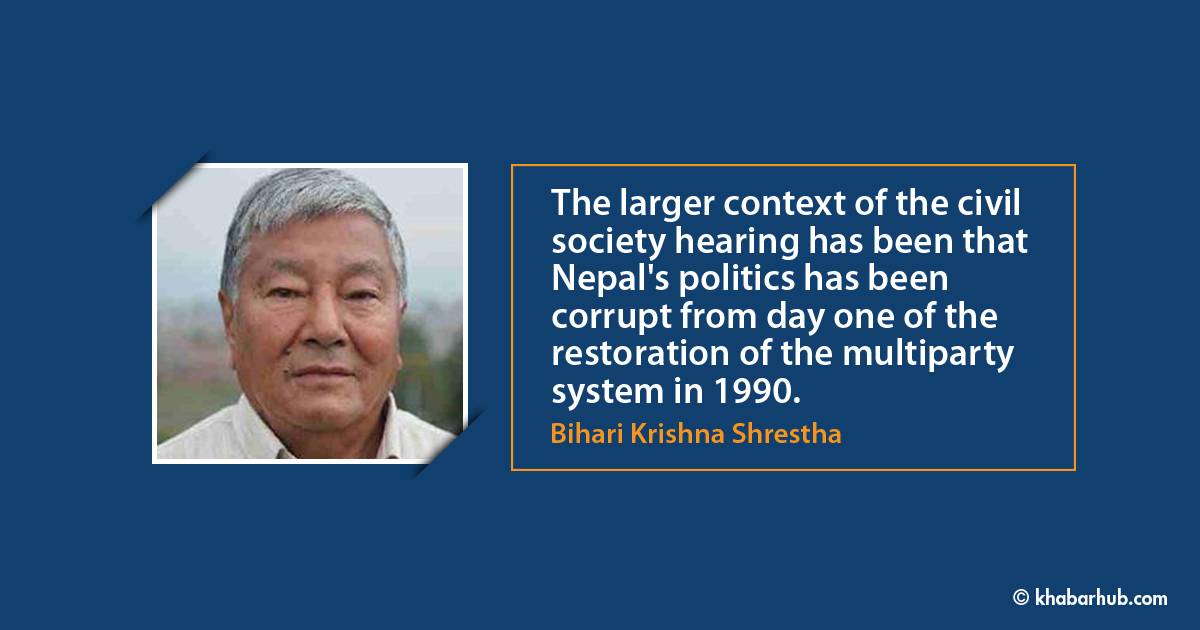0%

Last Saturday (March 23) so-called Grand Civic Agitation (Brihat Nagarik Andolan) organized a public hearing at the Nepal Academy premises in which two moderators, including one senior professor of political science at TU, Krishna Khanal, questioning a quartet of political leaders from four major parties in front of a few hundred spectators in the audience.
The context of the hearing was the current political stalemate following two recent verdicts of the Supreme Court.
While the first one, delivered on Fagun 11, restored the House of Representatives dissolved by PM Oli in violation of the intent of the constitution, the second one on Fagun 23 scrapped the name of the new communist party, the NCP, that had been formed by the unification of the then CPN-UML) and CPN (Maoist Centre), on the ground, that it clashed with that of another communist party that has been in existence already.
The verdict stated that the two parties should now be back to their earlier separate identities and that they should together find a new name for their reunification.
However, since the conflict in the NCP was already at its peak tending towards a breakup this verdict had only made the split easier.
In short, the quartet of politicians facing the crowd during the hearing represented the entire spectrum of vices that have kept Nepal’s democracy dysfunctional and the country impoverished and backward all these years.
But a section of leadership in the erstwhile NCP has found it convenient to externalize their own problem by blaming the apex court.
Of the four parties present in the hearing, two were represented by their heads, the newly restored Maoist Centre by Pushpa Kamal Dahal Prachanda and the Janata Samajbadi Party by Mahantha Thakur.
Of the other two, the resurrected UML was represented by its disgruntled senior leader, Madhav Kumar Nepal, and the Nepali Congress by its leader Minendra Rijal.
Degenerated politics
The larger context of the civil society hearing has been that Nepal’s politics has been corrupt from day one of the restoration of the multiparty system in 1990.
While just about every single politician remains a corrupt man or woman in the country today, political corruptibility has been getting worse with every change of government over the last three decades.
Consequently, the current Oli government remains one of the worst in the regard, with the PM himself alleged to have been involved in mega scandals such as the Wide Body scam, Yeti Holding deals and many more.
While a shady deal in health procurement known as the OMNI scam remains one of the latest such scandals to hit the Oli government, the PM’s daredevil insensitivity to charges of corruption was fully in view when he defended his health minister than by claiming that “there has been no corruption because I said so.”
But then, the Oli government is not the only entity that is corrupt in the country. Of the four politicians gathered in the public hearing, Prachanda remains by far the most notorious.
While he has the blood of 18,000 innocent lives on his hand, he is also alleged to have defrauded the government in billions in payment for non-existent combatants for which there is a case standing in the CIAA against him.
By any definition, it is clearly a disgrace for the nation. It is also hard to understand what the so-called Brihat Nagarik Andolan with its mutating agenda over the last couple of months is actually aiming at.
Then there was NC’s Minendra Rijal. While he is a blatantly pro-Indian politician–he is on record to have denied that India had blockaded Nepal in 2015–he represents a party that had done disastrously poorly in the last election; but its chair, Deuba, who was known to have bartered even local bodies’ election tickets for cash, has simply refused to step down from that lucrative post in blatant contravention of established democratic norms around the world.
Then there was Mahantha Thakur whose party’s treasonous leadership had, two months after staging Gaur Massacre, colluded with India’s RAW in a meeting with India’s RAW at Patna, India to disintegrate Nepal by declaring “Independent Madhesh” on 27 May 2007.
And UML’s Nepal not only has never been a principled politician, but he also stands implicated in the Baluwatar land scam.
In short, the quartet of politicians facing the crowd during the hearing represented the entire spectrum of vices that have kept Nepal’s democracy dysfunctional and the country impoverished and backward all these years.
The disgrace
But the hearing itself had gotten underway with the myopic question from Professor Khanal addressed to Prachanda.
The question was why they did not have a plan B for dislodging Oli from premiership as if Oli was the only impediment to the proper practice of democracy in Nepal. As a matter of fact, despite all these shortcomings, Oli still enjoys a saving grace.
He had the temerity to turn to China during India’s blockade of Nepal in 2015 to the total discomfiture of the southern neighbor that was known to have extended much personal benefit to the former in the past.
In his place, none of the other politicians would have dared it, not Prachanda, not Deuba, and just forget about the Madhesi politicians.
So, coming from a senior professor of political science in the TU, the question showed the extent to which even the academic community in Nepal remains bigoted in its views.
By any definition, it is clearly a disgrace for the nation. It is also hard to understand what the so-called Brihat Nagarik Andolan with its mutating agenda over the last couple of months is actually aiming at.
The saving grace for them is that on Saturdays, they are still able to attract the attendance of a few hundred people, although it remains a very far cry from what “Brihat” should actually mean.
(The author is former government Secretary)
The views expressed in this article are the author’s own and do not necessarily reflect Khabarhub’s editorial stance.